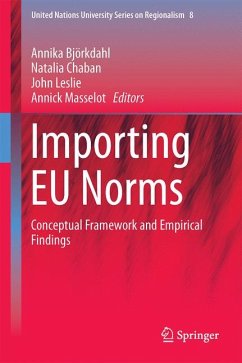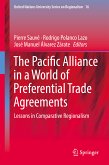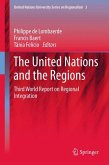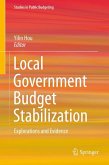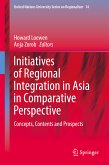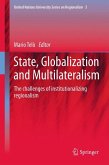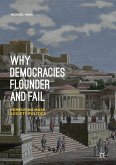This interdisciplinary work presents a conceptual framework and brings together constructivist and rationalist accounts of how EU norms are adopted, adapted, resisted or rejected. These chapters provide empirical cases and critical analysis of a rich variety of norm-takers from EU member states, European and non-European states, including the rejection of EU norms in Russia and Africa as well as adaptation of EU practices in Australia and New Zealand. Chapters on China, ASEAN and the Czech Republic demonstrate resistance to EU norm export. This volume probes differences in willingness to adopt or adapt norms between various actors in the recipient state and explores such questions as: How do norm-takers perceive of the EU and its norms? Is there a ‘normative fit’ between EU norms and the local normative context? Similarly, how do EU norms impact recipients’ interests and institutional arrangements? First, the authors map EU norm export strategies and approaches as they affect norm-takers. Second, the chapters recognize that norm adoption, adaption, resistance or rejection is a product of interaction and a relationship in which interdependence, asymmetry and power play a role. Third, we see that domestic circumstances within norm-takers condition the reception of norms. This book’s focus on norm-takers highlights the reflexive nature of norm diffusion and that nature has implications for the EU itself as a norm exporter. Anyone with an interest in the research agenda on norm diffusion, normative power and the EU’s normative dialogue with the world will find this book highly valuable, including scholars, policy makers and students of subjects including political science, European studies, international relations and international and EU law.
"This volume fills a major gap in our understanding of the European Union's normative power with its focus on the perceptions of third party recipients of EU norms and values. The editors have produced a book that combines conceptually strength with empirical richness to addresses an academic lacunae on the EU's norm takers to excellent effect."
Professor Richard G. Whitman
Professor of Politics and International Relations
Director, Global Europe Centre
University of Kent
"This exceptional volume makes a significant theoretical and empirical contribution to the research agenda on normative power by examining thirteen case studies in the impact of the cultural filter on EU norm diffusion. A genuinely rich diversity of scholars and case studies from across the world, including European, African, Australasian, Asian and global analyses, develop the cultural filter of EU norm adoption, adaption, resistance or rejection to excellent effect. Through an analytical emphasis on how the EU is received and perceived in the rest of the world, the volume makes an original and ground-breaking contribution to understanding the reflexive nature of EU norm diffusion and normative power."
Professor Ian Manners,
Department of Political Science,
University of Copenhagen
Professor Richard G. Whitman
Professor of Politics and International Relations
Director, Global Europe Centre
University of Kent
"This exceptional volume makes a significant theoretical and empirical contribution to the research agenda on normative power by examining thirteen case studies in the impact of the cultural filter on EU norm diffusion. A genuinely rich diversity of scholars and case studies from across the world, including European, African, Australasian, Asian and global analyses, develop the cultural filter of EU norm adoption, adaption, resistance or rejection to excellent effect. Through an analytical emphasis on how the EU is received and perceived in the rest of the world, the volume makes an original and ground-breaking contribution to understanding the reflexive nature of EU norm diffusion and normative power."
Professor Ian Manners,
Department of Political Science,
University of Copenhagen
This volume fills a major gap in our understanding of the European Union's normative power with its focus on the perceptions of third party recipients of EU norms and values. The editors have produced a book that combines conceptually strength with empirical richness to addresses an academic lacunae on the EU's norm takers to excellent effect.
Professor Richard G. Whitman
Professor of Politics and International Relations
Director, Global Europe Centre
University of Kent
This exceptional volume makes a significant theoretical and empirical contribution to the research agenda on normative power by examining thirteen case studies in the impact of the cultural filter on EU norm diffusion. A genuinely rich diversity of scholars and case studies from across the world, including European, African, Australasian, Asian and global analyses, develop the cultural filter of EU norm adoption, adaption, resistance or rejection to excellent effect. Through an analytical emphasis on how the EU is received and perceived in the rest of the world, the volume makes an original and ground-breaking contribution to understanding the reflexive nature of EU norm diffusion and normative power.
Professor Ian Manners,
Department of Political Science,
University of Copenhagen
Professor Richard G. Whitman
Professor of Politics and International Relations
Director, Global Europe Centre
University of Kent
This exceptional volume makes a significant theoretical and empirical contribution to the research agenda on normative power by examining thirteen case studies in the impact of the cultural filter on EU norm diffusion. A genuinely rich diversity of scholars and case studies from across the world, including European, African, Australasian, Asian and global analyses, develop the cultural filter of EU norm adoption, adaption, resistance or rejection to excellent effect. Through an analytical emphasis on how the EU is received and perceived in the rest of the world, the volume makes an original and ground-breaking contribution to understanding the reflexive nature of EU norm diffusion and normative power.
Professor Ian Manners,
Department of Political Science,
University of Copenhagen
